BY LINCOLN ANDERSON | Family, friends and comrades gathered at St. Mark’s Church in the Bowery on Sat., May 15, to remember Frances Goldin, the legendary Lower East Side housing activist and literary agent, whose books reflected her radical politics.
Goldin died a year ago, on May 16, at age 95. The memorial was put off this long due to the COVID pandemic.
Attendees sat, socially distanced, both inside the East Village church, as well as in both its east and west yards, where video screens were set up to watch the memorial. Speakers delivered their tributes either in person at the church or in recorded videos.
Among the latter was Mumia Abu-Jamal, who is serving a life sentence after being convicted of killing a Philadelphia police officer and who was one of Goldin’s authors. Speaking inside the church was bestselling novelist Barbara Kingsolver, another client.
Also inside St. Mark’s were Manhattan Borough President Gale Brewer and Councilmember Carlina Rivera. However, no politicians were included on the lengthy speakers’ list, which was all family, friends and professional colleagues.
Goldin was a founder of the Cooper Square Committee. The group famously defeated Robert Moses’s urban renewal plan to redevelop the area around Third Ave. and the Bowery as another Stuyvesant Town.
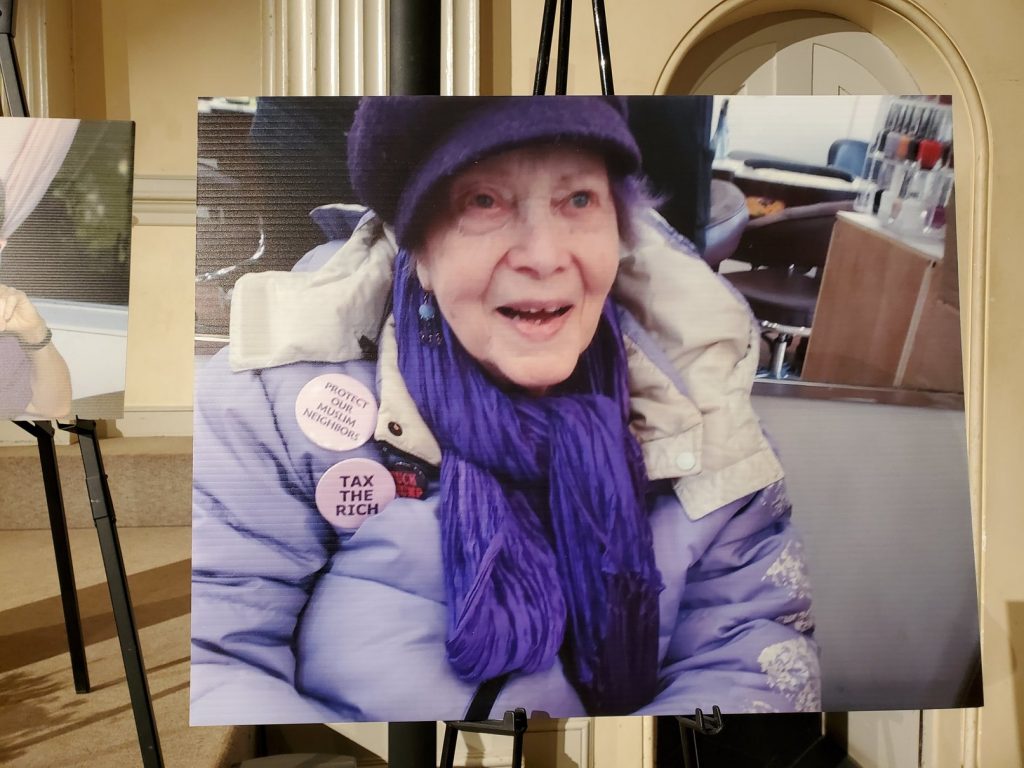
She was also a founder of Met Council on Housing, the Lower East Side Joint Planning Council and Coalition for a District Alternative, or CoDA, the organization responsible for electing the East Village’s last three councilmembers, Margarita Lopez, Rosie Mendez and Rivera.
A committed socialist, Goldin was remembered as an inspiring leader, fighter for justice and righteous “troublemaker” but also as a caring friend and confidant, full of boundless life, love and humor. Perhaps combining it all into one, a poet dubbed her a “purple unicorn.”
A number of speakers declared, “Frances, presente” (Spanish for “present”), meaning her powerful spirit — of both activism and love — was alive among all of them there. Without Goldin’s wise take on things, some said they now find themselves often wondering, “What would Frances do?”
Many wore purple, Goldin’s signature color, and sported her purple political buttons.
She was born Frances Axler in Queens, the youngest of three children. Her mother was a seamstress and her father a mechanic for the I.R.T. subway system. Growing up in Springfield Gardens, hers was one of the very few Jewish families and she was the target of anti-Semitism.
At age 20, Frances married Morris Goldin, through whom she got involved in the Communist Party, though she left it after about a decade. They moved to the Lower East Side and raised two daughters, later divorcing in the early 1970s.
Speakers at the memorial variously recalled Goldin’s fiery politics and her tender humanity, ranging from her many arrests to her love of pastrami sandwiches, and the staff, at the 2nd Ave. Deli.
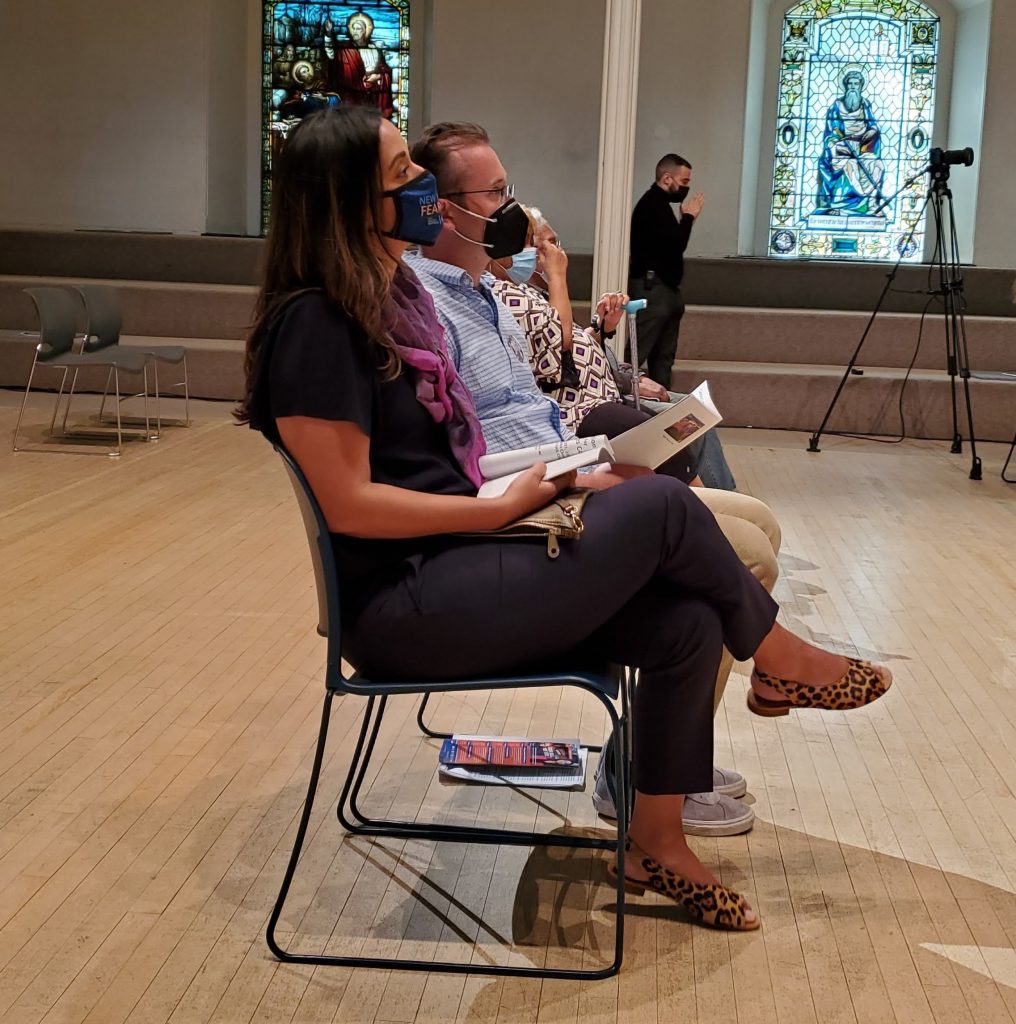
Reeni Goldin, Frances’s younger daughter, recalled her mother’s “first arrest,” in the late 1960s.
“She was being driven home after a late-night meeting,” she said. “She saw a cop hassling an older black guy.”
Goldin reached out to turn the cop’s badge, so she could see his number.
“He swatted her arm away,” her daughter recalled, “so she slugged him. … It turned out that the guy [who was being hassled] just had brain surgery and he was terrified he would get hit in the head.”
Goldin’s next bust came as she agitated for a rent strike during a Rent Guidelines Board hearing at The Cooper Union’s Great Hall. After Goldin was hauled off, other tenant leaders, in a show of solidarity, kept ceding their speaking time to her.
As a result, her daughter said, “The meeting was adjourned.”
“She wanted to get to 12 arrests, an even dozen,” she added. “She only got to 10.”
But Goldin kept trying. At age 87, she urged a cop to arrest her at the Occupy Wall Street encampment at Zuccotti Park but to no avail.
“She said, ‘Well what if I punch you in the eye?” her daughter recalled. “‘What if I punch you in the nuts?’”
Reeni Goldin also mentioned how her mother, for more than 40 years, always carried her iconic “I Adore My Lesbian Daughters” sign at the Pride March.
“People would come up to her and say, ‘Can you be my mother?'” she said.
Frances Goldin would assiduously write down their names and contact information, then call their parents and urge them to appreciate their L.G.B.T. children.
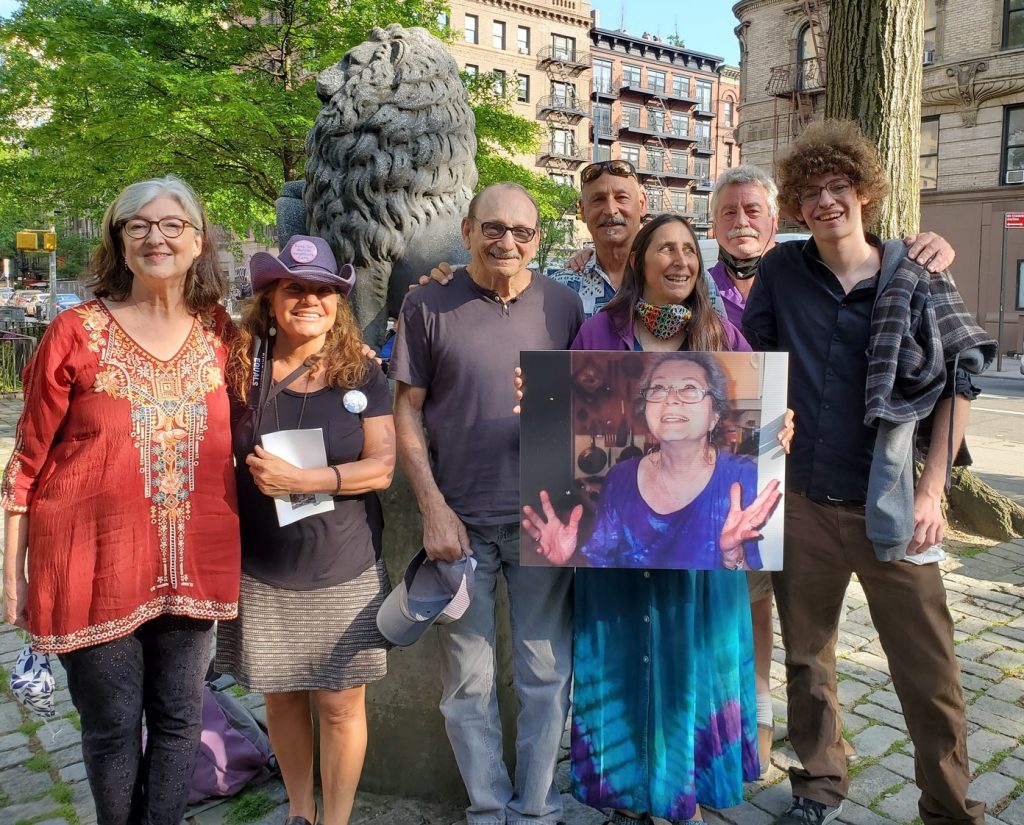
Reeni said Frances had a bucket list with three items. First, she wanted to see the tenants of the Cooper Square Mutual Housing Association be able to own their apartments; that happened in 2012 when the tenants were allowed to buy their units for $250 with a 99-year renewable lease. Second, she wanted to see the book on socialism that she co-edited, “Imagine: Living in a Socialist U.S.A.,” published; that happened in 2014. Finally, she wanted to see Abu-Jamal freed from prison.
“It’s up to us to finish the job and get him home,” Reeni said to applause.
“Frances’s personal life reflected her revolutionary politics,” said Joyce Ravitz, a longtime friend and ally. “You could be invited for blintzes, but by the end of the evening you’d be talking about the best place to go for the next demonstration. … We loved the theater, we loved games, we tried to learn Spanish. She loved to dance.”
Ravitz said Goldin saw the racially mixed Lower East Side as “a panacea to the bigoted homogenous Queens” where she grew up.
“She saw housing as a human right,” she said.
Through Goldin, Ravitz got involved with the Cooper Square Committee and for roughly the past decade has been its board chairperson.
“Thank you for changing my life,” Ravitz said, “for giving me revolutionary ideas that I don’t think I ever would have thought of. … Frances, presente.”
Frances Fox Piven, a CUNY political science professor, was among Goldin’s roster of writers.
“She was boisterous and she was bold,” she said of Goldin. “She could talk a mile a minute. … She was so wise. I could take any personal problem to Frances. So indomitable, so articulate, and also she was so much fun. For Frances, organizing was fun — always music, always dancing.”
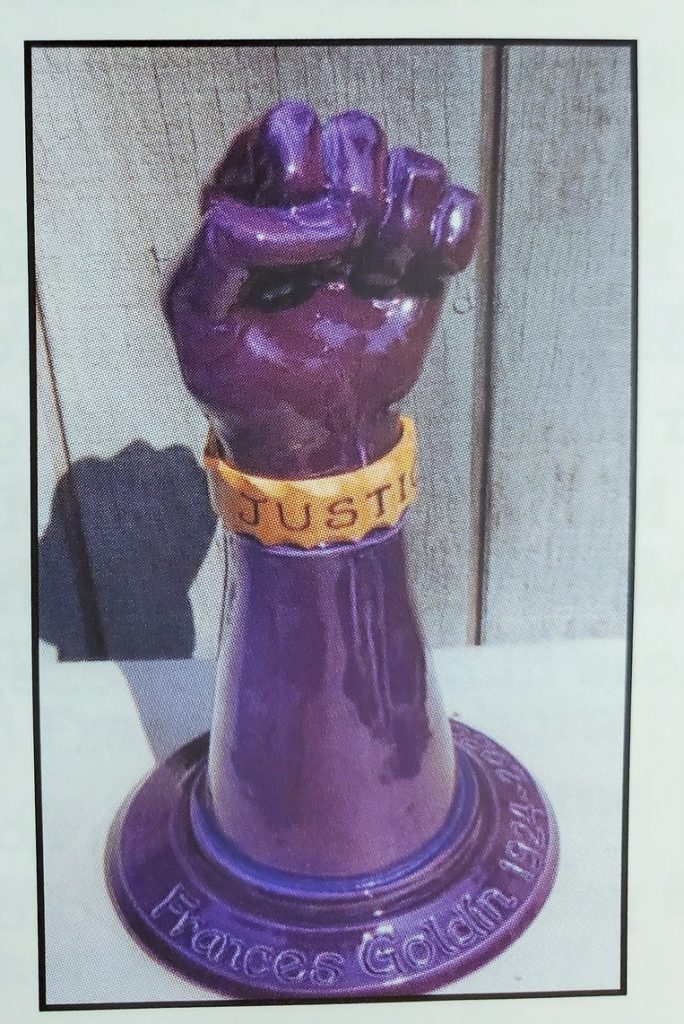
Ellen Geiger, an agent at the Frances Goldin Literary Agency, said Goldin would not take no for an answer.
“She was completely undaunted by the first no,” she recalled. “Rather she saw it as the long game.”
One famous “get” was the poet Adrienne Rich. Initially, Rich told Goldin that she had always represented herself. But she later called back to ask what an agent could do for her.
“Sensing the moment to pounce had finally arrived, Frances asked her how much did she get for her last advance?” Geiger said. “Adrienne said, ‘What’s an advance?’… Got her!
“She took me to the maximum security prison to visit Mumia,” she added, recalling her incredulity. “I had never been on death row.”
“It Took 50 Years,” a video tribute to Frances Goldin and her work with the Cooper Square Committee in defeating Robert Moses’s urban renewal plan and, in turn, completing an alternative community plan, was shown at the memorial.
Goldin’s niece Ellen Marks shared memories of going with Goldin to the 2nd Ave. Deli, when it was on E. 10th St. and Second Ave., just a block away from where she lived on E. 11th St. Goldin would effusively introduce her to the owner and staff, and order her favorite, chopper liver. It was a sad day for her when a bank replaced the deli.
Her niece recalled that, “When the 2nd Ave. Deli moved, she regularly went into the Chase bank and asked loudly for a pastrami and rye.”
One of Goldin’s famous sayings was that when the real estate industry changed the name of the Lower East Side to the East Village, the rents tripled.
Ellen Marks, a niece, paid tribute to her aunt’s fearless and loving nature.
“She raised hell at every injustice she saw,” she said. “She’d stand for freedom. She chained herself to the Liberty Bell to protest capital punishment. She’d sing — loudly. She’d challenge you to do just a little bit more. She’d hug you with her whole soul. She’d wear purple.”
Joshua Leonard remembered coming to visit his “radical aunt” in the East Village. Things were a bit up in the air, though, he recalled, because “she might be in jail because of a Mumia protest but she will definitely be out by Monday.”
“So much of who I am today is because of Frances,” he said.
Roberta Schine, Goldin’s yoga teacher, said that when class members were asked to pick a partner, the activist would always choose someone who looked vulnerable and needy.
Though an atheist, Goldin accompanied Schine to synagogue one time. Once was enough for her.
“I haven’t set foot in a synagogue for 65 years,” she told Schine afterward, “and if I don’t set foot in one for another 65 years, it’ll be O.K. with me.”
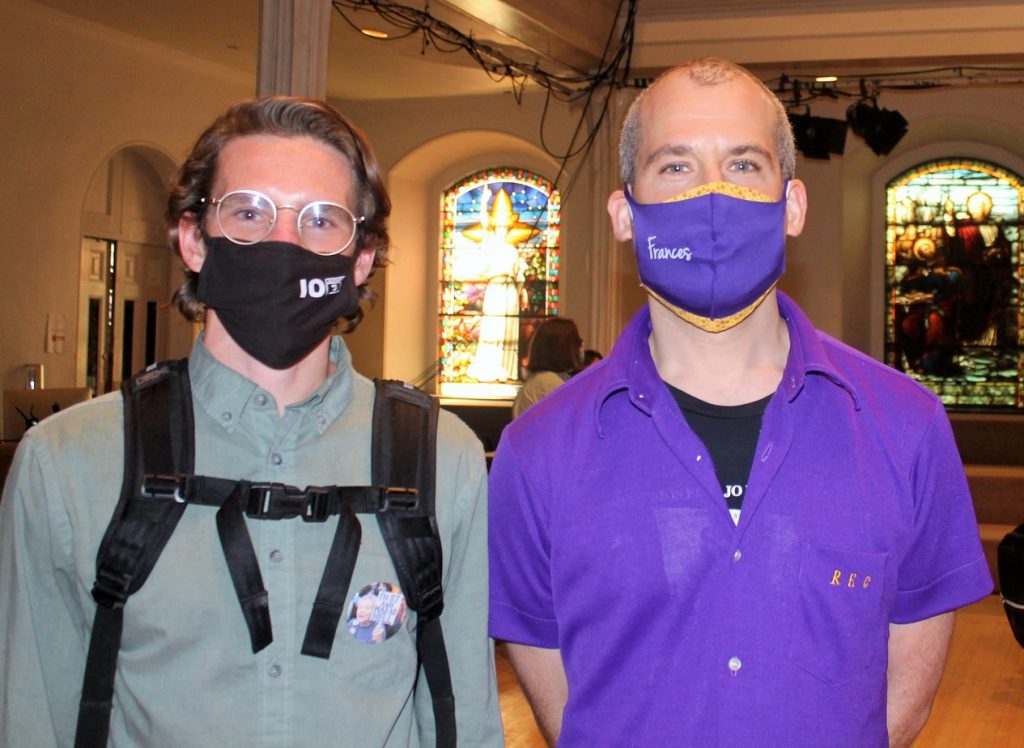
Steven Marks, another nephew, recalled a side of Goldin that not everyone knew, her close bond with her older sister, Ann. The two grew up sharing the same room, and the same bed, until Ann got married at 19 and moved out.
In her later years, Ann suffered from dementia; Frances would visit her and recreate their formative bond.
“Every year she would find a week to snuggle with her in bed,” Marks said. “You’ve been hearing about the warrior; this is the tender side.”
Frances also had an older brother, Jesse, but they were not close.
Amy Jannelli, a cousin, recalled that Goldin adored her father but “her mother disowned her.”
Staceyann Chin, a spoken-word poet, was represented by Goldin.
“She was magic and a unicorn and beautiful and a gift to the world,” she said. “Frances was a purple unicorn. Frances was my friend, and she remains one of the best examples of how to live a life, from start to finish.”
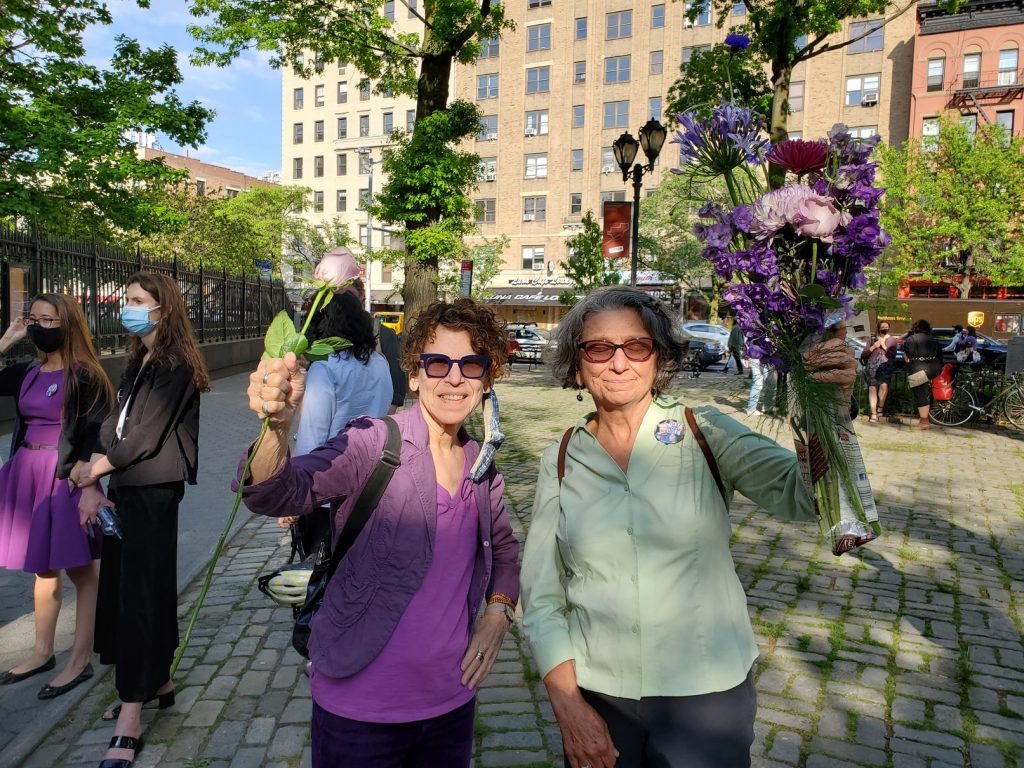
Lisa Kaplan, a former chairperson of Community Board 3 and longtime friend and ally of Goldin, called her “the most amazing woman I have ever known.”
She recalled how Goldin was arrested at the old Board of Estimate for protesting the city’s removal of 100 units of affordable housing from a plan for the Seward Park Urban Renewal Area a.k.a. SPURA. Assembly Speaker Sheldon Silver and former Borough President Andy Stein were among those who blocked affordable housing being built on the site just south of the Williamsburg Bridge entrance.
After decades of inertia, though, in 2006, under Mayor Bloomberg, a redevelopment plan with 50 percent affordable, low-income and moderate-income housing in perpetuity was approved for SPURA, which was redubbed Essex Crossing. The scheme notably included a senior housing building named the Frances Goldin Senior Apartments.
“It was a belated thumbing of the nose to the political elite,” Kaplan noted, “including Andy Stein and Sheldon Silver, who had excluded affordable housing there.”
She said former Mayor Ed Koch would always acknowledge Goldin at meetings: “‘Madame Defarge, what do you have to say?’ She would be knitting.”
Kaplan also related the famous story of how a young Goldin reacted when an employer, a rabbi, made an unwanted advance: She bit his finger.
“This was 70 years before MeToo,” she noted.
Mike Smith and his wife, Debby Smith, were co-editors with Goldin on “Imagine: Living in a Socialist USA.” He said Goldin forced a reluctant HarperCollins to publish the book; she argued that she had brought the company top-selling authors like Kingsolver, so they owed it to her if she wanted to do what might be a less commercial work.
“The book did pretty well,” he noted, adding the co-editors gave all the profits to the Mumia Abu-Jamal Defense Fund.
Tito Delgado was one of six residents out of 3,000 displaced from SPURA more than 50 years ago who, under a right of return, got units in the Frances Goldin Senior Apartments when it opened in 2018. Now with limited vision and walking with a white cane, he was helped up to the podium by Councilmember Rivera.
“I came for heat and hot water,” he said, “and Frances gave me a worldview.”
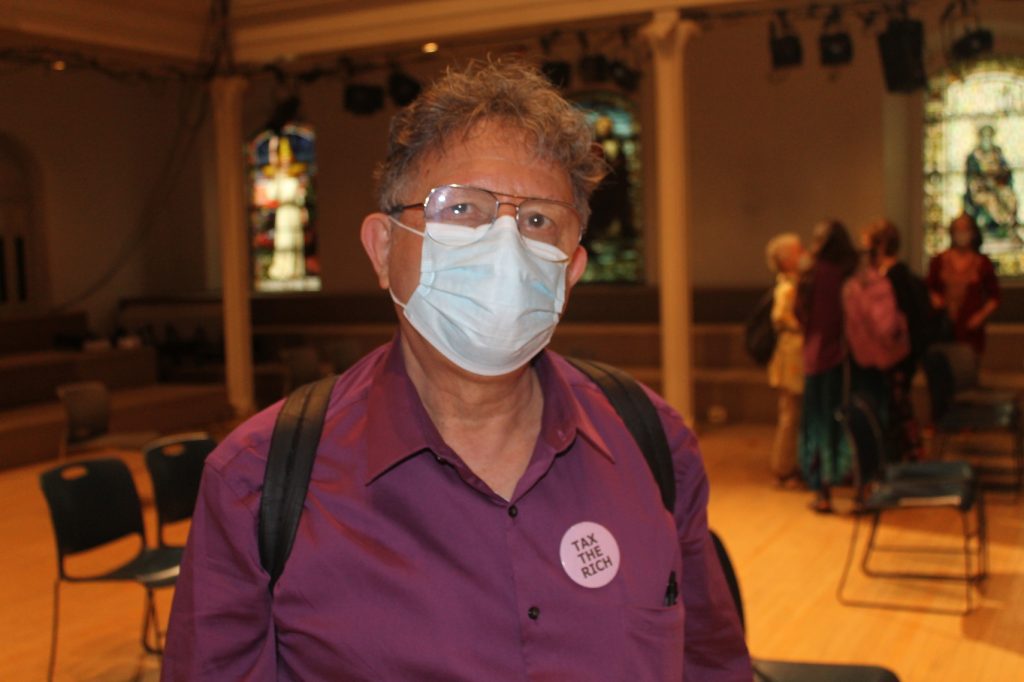
Anne Johnson, another former C.B. 3 chairperson, said she first became acquainted with Goldin “when there was a 60th birthday march for her down Second Ave. I figured she must be somebody.” The two would go on to serve on C.B. 3 together.
Decked out in purple in Goldin’s honor, Johnson said, “She was one of a kind, and I doubt we will ever see another like her. The way we can honor her is to keep up the struggle.”
Harriet Cohen met Goldin when she interviewed her for her master’s thesis, which she did on SPURA.
“Wherever you are, we love you,” she said. “And we know that you’re wearing a pin that says, ‘Palestinian Lives Matter.’”
Blanche Wiesen Cook, the author of a widely hailed Eleanor Roosevelt biography, called Goldin “our leader, our mentor, our guide — the most generous, creative, inspiring mentor and friend.”
She contributed a piece to Goldin’s “Imagine” socialist anthology.
“As she frequently said,” Wiesen Cook recalled, “‘We will have socialism or we will have barbarism.’…
“We will go forward inspired by her legacy, hearts open, fists high.”
Susie Lichtenberg remembered becoming friends with Reeni in the playground when they were kids and how Goldin would crack them up.
“She made us laugh so hard,” she said, “we had to run to the bathroom so we wouldn’t pee in our pants.”
She said Goldin inspired her to become a special-ed teacher.
Goldin’s other daughter, Sally Goldin, told an anecdote of how, when she was a newborn, her mom wanted to breastfeed her but a nurse responded the hospital did bottle-feeding and insisted it was perfectly fine.
“True to form, she went and got me and breastfed me,” Sally recalled. “It caused a commotion. They thought I had been kidnapped. She said, ‘I told her I wanted to breastfeed her and no one listened to me.’”
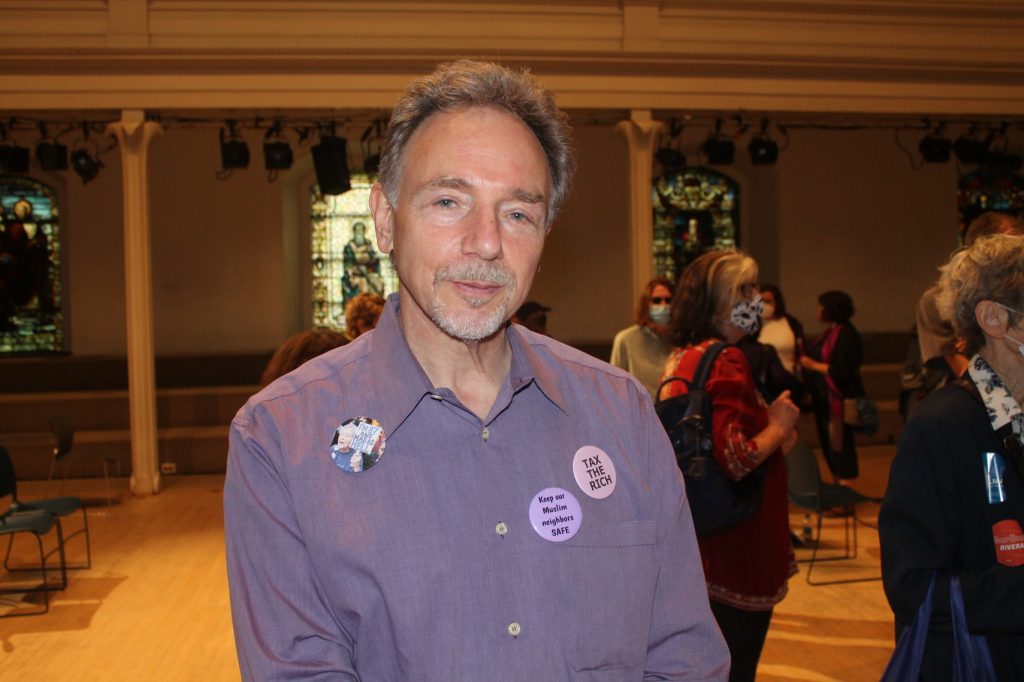
From a background as an anti-Vietnam War activist, Valerio Orselli became an organizer with the Cooper Square Committee in 1972.
“She fought Sheldon Silver and his political machine to racially integrate the Grand St. co-ops, where he lives, and for the SPURA plan,” he said of Goldin. “Goodbye, dear comrade. You are missed,” he said. “You will never be forgotten.”
Dave Powell, the executive director of the Cooper Square Mutual Housing Association, proudly noted that, unlike what happened with SPURA, no one was displaced from the Cooper Square Urban Renewal Area.
“In this community, leadership rises from the soil,” he said. “Frances Goldin was the gardener. You set us up and we got this now.”
Goldin started her literary agency in 1977. Sam Stoloff currently heads it.
“She loved to tell a dirty joke and laugh,” he said. “I can still see her, leaning back in her chair, filing her nails, telling a publisher he had to double his offer. The literary agency has changed but it’s still going strong, still doing books that promote the cause of justice. She’s still stiffening our spine.”
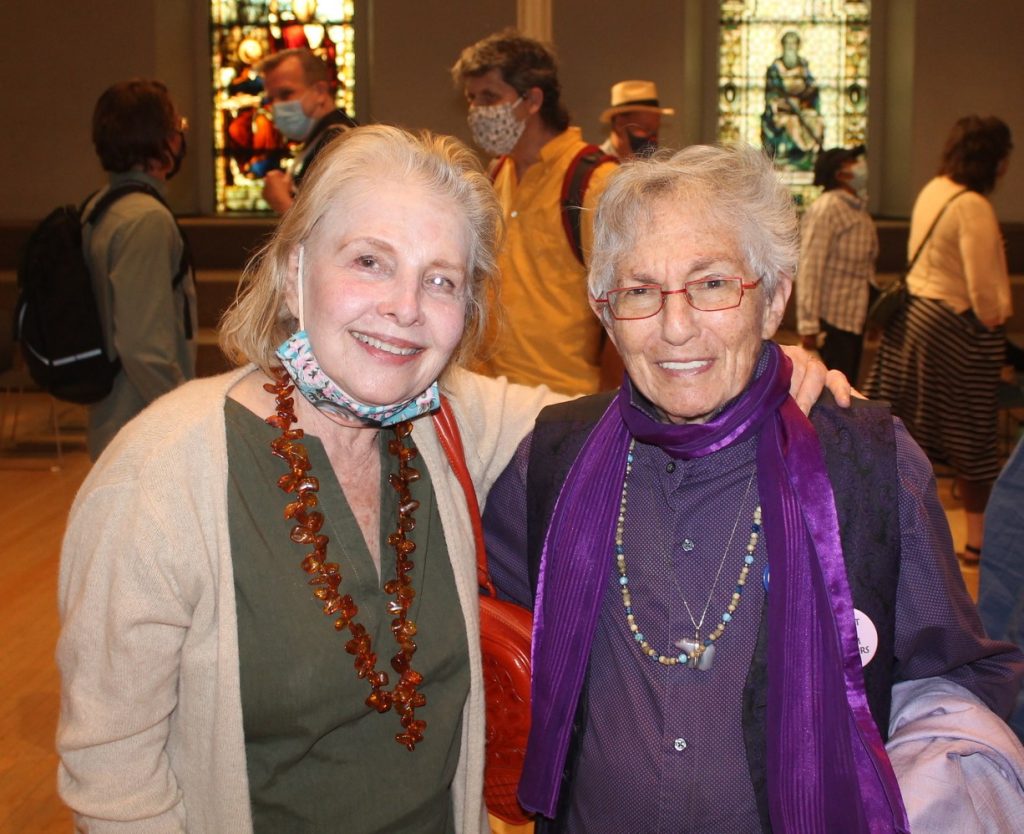
Among those listening in the audience was Emily Jane Goodman, a former New York State Supreme Court justice. She met Goldin during housing rights struggles when she was an attorney.
“Frances was like the white Flo Kennedy,” she said, referring to the late outspoken civil-rights activist.
In a recorded video from prison, Abu-Jamal said farewell to his agent, ally and friend.
“Her vibrant spirit is still with us,” he said. “And if we had to [imagine] what she would be doing today…I think we really know… There she would be. … Her white hair spiked with purple…marching in Black Lives Matter protests. And it wouldn’t really matter if she used her cane, a walker, a wheelchair or a golf cart, she would be there, her chin high, unbowed. Frances Goldin, presente. Frances Goldin, remembered.”
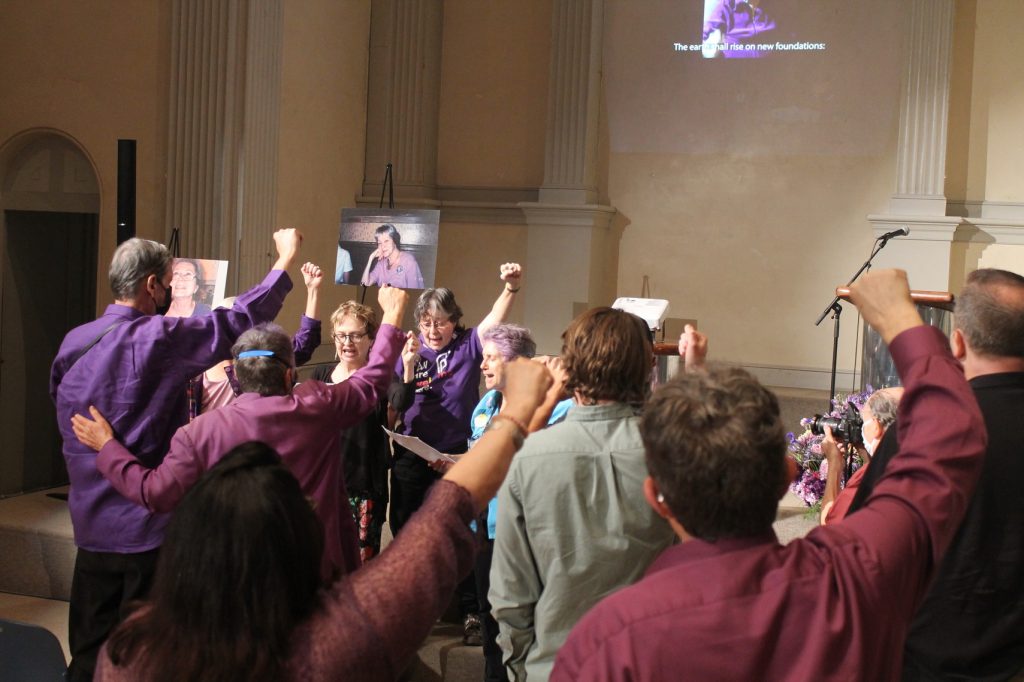
The memorial concluded with the audience singing the socialist anthem “The Internationale,” with some raising their fists in a fight-the-power salute as they sang.
Speaking afterward, Orselli, who formerly ran the Cooper Square M.H.A., said, “Frances did not want to be forgotten. I think it was because she gave out so much love and gave such attention to detail. … And keep in mind, she never got paid [for her organizing and activism]: It was totally out of politics and her love for the community.”
Judging by the many heartfelt tributes shared at the memorial, the remarkable legacy of housing and social justice she left, the leftist books she shepherded into print, the progressive causes she championed, and her sparkling and charismatic personality, Goldin definitely will not be forgotten.

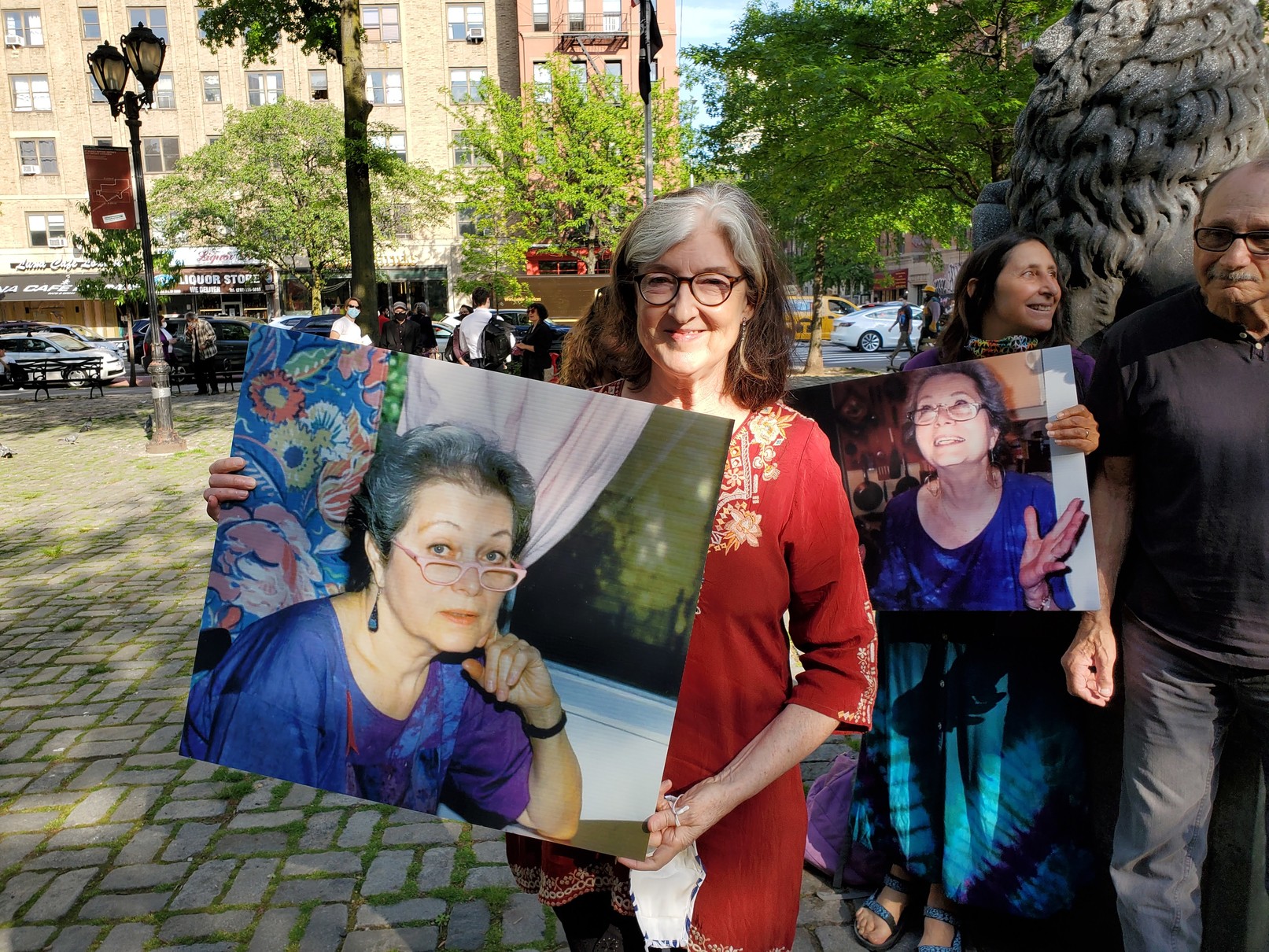
Excellent article. Covered all the important facts about Frances and her epic struggle for our community and for so many others. One error, when you quoted me as sayng that Black and Latino applicants who tried to apply for the Grand Street co-ops were told to come back in a few weeks. That wouldn’t have been a problem. They were actually told to come back in ten years, while white applicants were quckly accomodated. That is why a lawsuit had to be filed (Huertas v. East River Housing). And that is why after the lawsuit was settled allowing for 30% of the units to be allocated to Black and Latino applicants for 7 years, the co-ops decided to go private.
Of course I meant 30% of all the vacancies.
Community Board 3 would be well served to have some members who stand up like Frances. It did not matter if you were left, right or center she was tireless in her fight for the underdog. She was a real model for anyone wanting to join the struggle for social justice. We are all better off for having known her.
Tommy Loeb